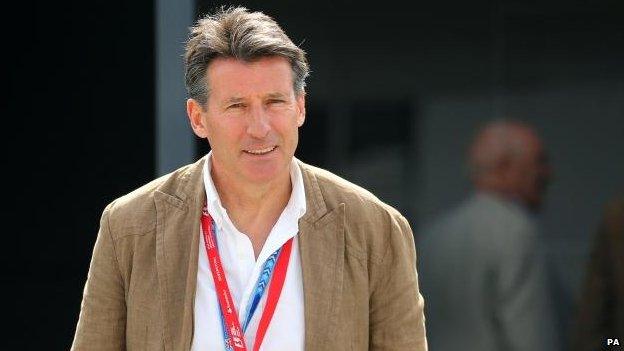Why Coe is set to win BBC race
- Published
- comments

Lord Coe led London's Olympics bid and chaired the organising committee for the games
Here are a couple of mildly interesting tidbits about my own shop, the BBC.
First (and there is nothing terribly revelatory about this) Lord Coe is a virtual shoo-in to be Lord Patten's successor as chairman of the BBC Trust.
Of course his appointment is not 100%, because there is a formal and slightly cumbersome appointments process.
That process includes interviewing and vetting by a Department of Culture, Media and Sports appointments committee, a recommendation of a preferred candidate by government - after all the "appointable" candidates have been interrogated by the culture secretary, Sajid Javid - then pre-appointment scrutiny by MPs on the DCMS select committee and then formal appointment.
Phew.
But for the government, which for this sort of thing really means the prime minister and chancellor, Lord Coe is the outstanding candidate.
So presumably they will find a way to get him over these many hurdles.
Why do they rate him so highly?
Well they know him well (George Osborne and Coe once shared an office, I think), and they regard him as an impressive leader, with a remarkable record of success off the track (leading London's Olympics bid, chairing the organising committee for the games, and so on).
One senior government source complained that among the chattering classes Lord Coe is widely and snootily under-rated "as that bloke who won some gold medals".
Oh, and he is a Tory, which is de rigueur (other candidates take note).
Also Lord Coe is reckoned to be broadly positive about the BBC, which matters to Cameron and Osborne because - unlike perhaps the majority of Tory MPs - they are supporters of and believers in the BBC.
Which is not to say they are blindly uncritical.
But they place value on how the BBC wins important friends for Britain overseas - the role it plays in reinforcing the country's "soft power" - and what they would see as its largely standard-raising role in the ecology of UK news, arts and media businesses.
That does not mean the review of the BBC's charter - which the government said when advertising for the post of Trust chairman will now not start till after the general election - would be easy for the BBC, if the Tories form the next government.
The BBC would doubtless face challenges on the scope of what it does and could not expect any increase in the licence fee out of line with austerity in the rest of the public sector.
But it does suggest the charter review would not be about dismantling the BBC; it would not be a choice between life and death.
That said, the review is likely to be rather more existentially challenging to the BBC Trust itself, the body that has the often uncomfortable task of reconciling sometimes conflicting responsibilities - those of regulator, representative of licence-fee payers (who for these purposes can be seen as the owners) and occasional human shield when the Director General lands in a spot of bother.
As I understand it, Osborne and Cameron have never quite understood why the regulation of the BBC could not be done in a cleaner and more ostensibly impartial way by Ofcom.
If the Trust's regulatory functions were removed, it would resemble something like the old governing board or even possibly a public company board, concentrating on oversight of senior executive appointments, money, risk and efficiency. There would be clarity that its ultimate duty of care would be to licence-fee payers.
With these more focussed duties, the BBC Trust chairman could step into the fray and shield the DG from heat in a crisis, without that compromising the chairman's perceived impartiality as regulator (a constant tension under the existing system).
All of which adds up to my second tidbit, which is that there may have been a misinterpretation of the fact that the advert for the Trust chair job says he or she will serve a four-year term.
This was seen as somehow evidence that radical reform of the Trust is off the agenda.
That, I am reliably told, is wrong: if the BBC is not dismantled, the Trust may be.